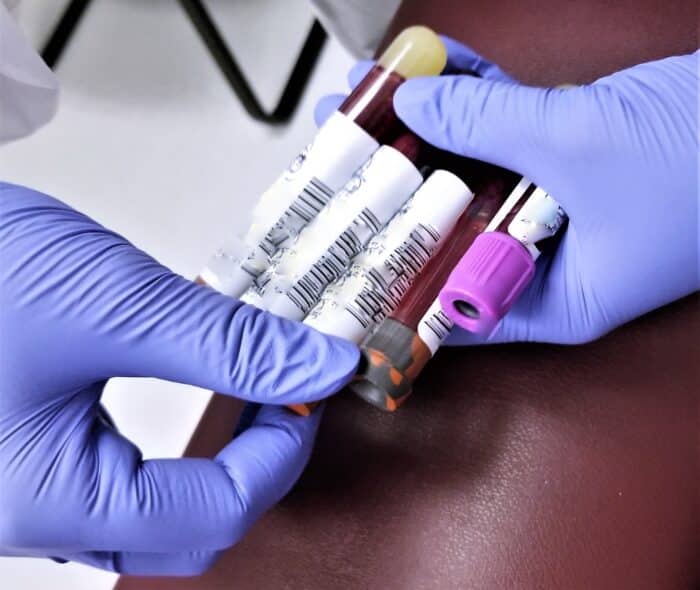Are you interested in working in healthcare but need help deciding which career to choose?
And are you also someone who is interested in medicine but doesn’t want to spend years on schooling?
If you nodded yes to these questions, then you can consider becoming a Phlebotomist Lab Technician.
Imagine being the person who gently draws blood from patients, making them feel comfortable while ensuring necessary medical tests can be done accurately. It’s a job that combines people skills with science, making it perfect if you enjoy both.
In this article, we’ll explore what a Phlebotomist Lab Technician is, if phlebotomists are the same as lab technicians, and what the difference is between a phlebotomist and a lab technician.
What is a Phlebotomy Lab Technician?
Now, coming to the main question you might be curious about: What is a phlebotomy lab technician?
A Phlebotomy Lab Technician is a healthcare professional who plays a crucial role in the medical field. Their main duties involve drawing blood, among others.
The roles and responsibilities of a Phlebotomy Lab Technician include:
- Drawing Blood: Their main job is to safely and gently collect blood samples using techniques such as venipunctures.
- Labeling and Storing: Once they have the blood, they carefully label the samples and send them to a lab. In the lab, scientists use these samples to run tests for diagnosis.
- Labelling Records: Phlebotomy Lab Technicians keep detailed records of the blood samples they collect, making sure they match the right person and the right tests.
- Patient Interaction: They need to be kind and comforting because getting your blood drawn can be scary for some people. They help patients relax and make the experience less scary.
Is a Lab Technician the Same as a Phlebotomist?
No, a Lab Technician and a Phlebotomist are not the same, although they work in related fields within healthcare.
Though their duties may sound similar, there are striking differences between the two. Let us break it down one by one.
A Phlebotomist specializes in drawing blood samples from patients. They focus on the collection of blood for testing and other medical purposes. Phlebotomists are skilled in venipuncture, making the blood collection process as comfortable as possible for patients.
On the other hand, a Lab Technician is responsible for performing various laboratory tests and procedures on the collected samples.
They work behind the scenes, analyzing blood, urine, and other bodily fluids, as well as running tests to assist doctors in diagnosing and monitoring medical conditions. While Phlebotomists gather the samples, Lab Technicians process and analyze them to provide valuable medical insights.

Do You Want To Become a Phlebotomist? Check Out Free Phlebotomist Masterclass!
In our masterclass you learn:
- How to be a Phlebotomist faster…in just 2 months!
- Avoid student debt & driving to classes
- #1 thing employers want from Phlebotomists
- How to stand-apart & get a university certificate for a strong resume
Read: Phlebotomist Salary
What is the Difference Between a Phlebotomist and a Lab Technician?
Phlebotomists and Lab Technicians have specific roles in the healthcare system. Phlebotomists collect blood and interact with patients, while Lab Technicians work in labs to analyze and test those samples. Both roles are crucial for providing accurate and timely information to support patient care.
Let us see how their roles differ in general:
Phlebotomist:
- Main Responsibility: Phlebotomists are experts at collecting blood. Their primary responsibility is to draw blood samples from patients.
- Dealing with Patients: They directly interact with patients and make sure the blood collection process is comfortable and safe.
- Skills: Phlebotomists are skilled in venipuncture, which means they’re good at using needles to take blood and correctly label the samples.
- Workplaces: You can find them in different healthcare settings, like hospitals, clinics, and blood donation centers.
Lab Technician:
- Main Responsibility: Lab Technicians work in labs. They handle the processing and analysis of samples, including blood, urine, and other bodily fluids.
- Dealing with Patients: They usually don’t have direct contact with patients because they work mostly in the lab.
- Skills: Lab Technicians are trained to use advanced equipment for testing, interpreting results, and reporting findings to doctors and healthcare professionals.
- Workplaces: They work behind the scenes in clinical laboratories, research facilities, and diagnostic centers.
Also see: Phlebotomist Requirements
Conclusion
The role of a Phlebotomist Lab Technician is essential in the healthcare field. These dedicated professionals play a crucial role in collecting blood samples and ensuring accurate testing, which ultimately helps in diagnosing and treating various medical conditions.
Their attention to detail, compassion, and commitment to patient care make them valuable members of the healthcare team. As we’ve seen throughout this article, the job of a Phlebotomist Lab Technician is not only vital but also rewarding, offering opportunities to make a positive impact on the lives of patients every day.
Related Resources:
- Day in the Life of a Phlebotomist
- Can A Phlebotomist Start IVs?
- What is the Main Responsibility of a Phlebotomist?
- What Do You Need To Be a Phlebotomist?
- Phlebotomy Externship
- What Jobs Can I Get With a Phlebotomy Certificate?
- Phlebotomist Nurse
- Phlebotomist vs CNA
- Therapeutic Phlebotomy
- Phlebotomist School
- Cardio-Phlebotomy Technician
- Online Phlebotomy Classes
- Order of Draw Phlebotomy
- Phlebotomy Internship
- 4-Week Phlebotomy Classes Online
Related Articles
-
How to Be Successful in College in 2022 – 7 Simple Tips to Succeed
-
How Do Scholarships Work? Read This First…Truth is Shocking
-
7 Best College Majors 2024: What Should I Major In?
-
How to Choose a College – 10 Things You Must Consider in 2024
-
Why Go to College? Top 13 Benefits for Adult Students in 2022
-
Top 5 Best Alternatives to Community College for 2024








